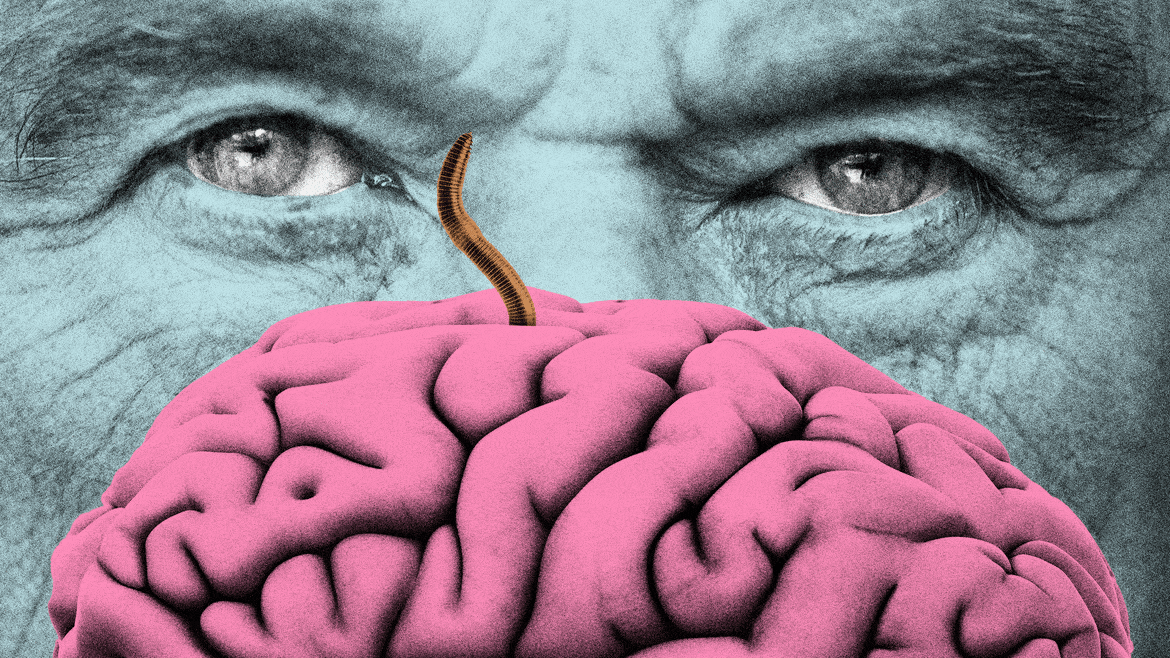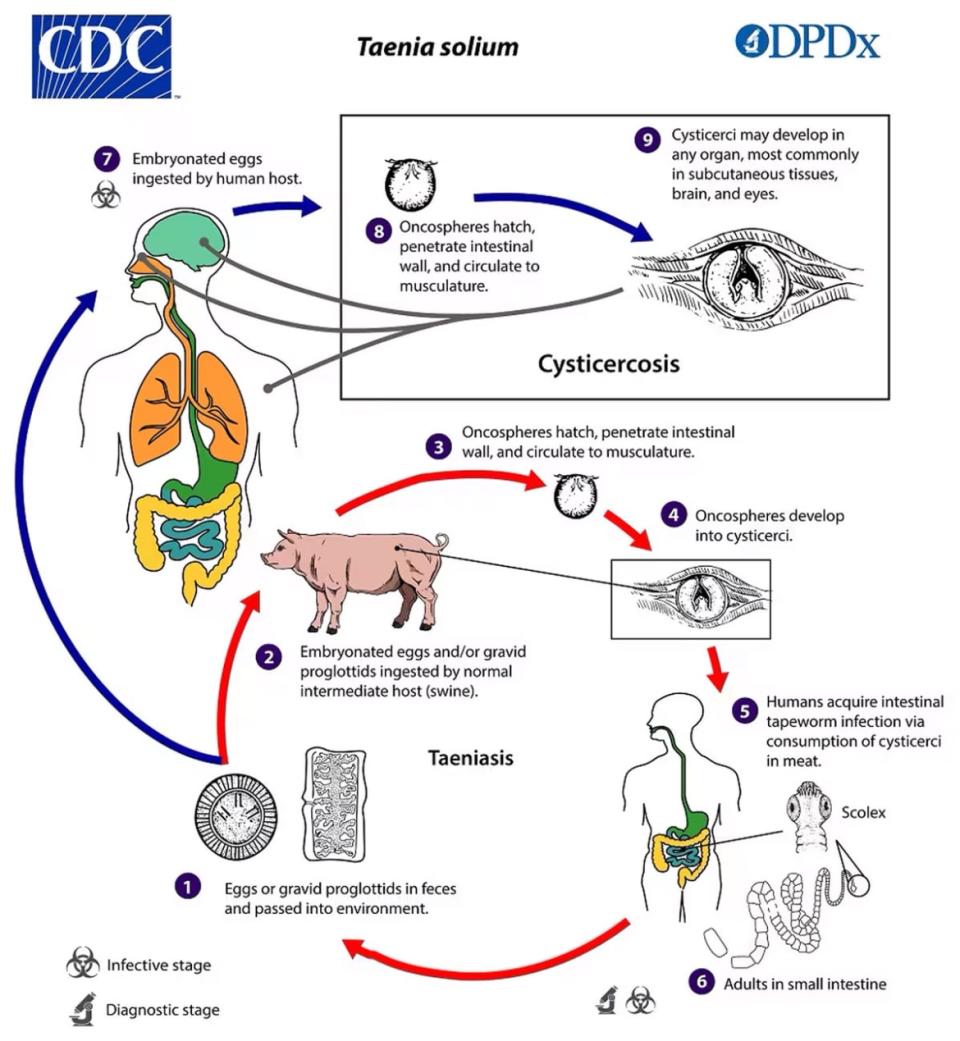You May Have a Brain Worm Like RFK JR. and Not Even Know it

Unapologetic conspiracy theorist and out-and-proud anti-vaxxer Robert F. Kennedy Jr. has long been accused by clearer heads of having “brain worms.”
On Wednesday, it emerged that an actual worm allegedly once set up shop in the longshot presidential candidate’s brain.
“[A] worm… got into my brain and ate a portion of it and then died,” Kennedy, 70, said during a 2012 deposition reviewed by The New York Times, which first published details of the previously unrevealed parasitic infection.
Kennedy, an environmental lawyer by trade, sat for the deposition amid divorce proceedings from his second wife, the late Mary Richardson Kennedy, claiming his overall moneymaking abilities had taken a hit due to decreased cognitive abilities. In addition to the brain worm, Kennedy said he had also been diagnosed around the same time with mercury poisoning, which he chalked up to a fish-rich diet.
Most polling shows a RFK Jr. presidency is highly unlikely. But if Kennedy—who has thus far not made his medical records publicly available, but said the worm infiltrated his brain in 2010—does manage to beat Joe Biden and Donald Trump to take the White House in November, any major missteps will almost certainly be of his own doing, not the worm’s, according to experts.
“The bottom line is, no, this would not cause lasting effects on someone’s mental abilities,” Dr. Philip Budge, M.D., PhD, a tropical diseases specialist at Washington University in St. Louis, Missouri, told The Daily Beast. “The worm in question does not ‘eat’ brain, regardless of what he says his prior doctor said. Rather, it forms a cyst that displaces a small amount of brain. When the cyst dies there is some inflammation that can transiently affect brain function but should not cause long-term consequences.”
Dr. Mario Madruga, director of the Internal Medicine Residency Program at Orlando Health, said a person can be completely asymptomatic and that a dead brain worm “usually” causes no problems.
“If the organism is dead and calcified, you don’t treat that,” he told The Daily Beast.
Still, the cyst left behind can occasionally serve as a catalyst for seizures, according to Madruga.
On the other hand, if a brain worm is “active, alive, and causing inflammation, you could definitely have symptoms,” Madruga said, noting that all manner of variables come into play, including location and how early the worm is discovered.
“Potentially, brain swelling—some of these parasites end up in areas where it blocks the spinal fluid from leaving the brain, which could cause increased pressure,” Madruga said. “That can be an emergency, and needs to be treated immediately: either steroids, anti-inflammatories, or even neurosurgery.”
In an email on Wednesday, Kennedy campaign press secretary Stefanie Spear said Kennedy “traveled extensively in Africa, South America, and Asia in his work as an environmental advocate, and in one of those locations contracted a parasite. The issue was resolved more than 10 years ago, and he is in robust physical and mental health. Questioning Mr. Kennedy’s health is a hilarious suggestion, given his competition.”
Many online have hypothesized that Kennedy was likely suffering from cysticercosis, a parasitic tissue infection spread by eggs from a tapeworm passed back and forth between pigs and humans. It is more likely to occur in those who live in, or have traveled to, places with poor sanitation and hygiene, according to Budge.
In some instances, cysticercosis can do significant damage, Budge explained, echoing Madruga. If the infection worsens, or if a larval cyst forms in a sensitive area of the brain, a person might develop “severe or lasting disease,” he said, adding, “But for most people, who may not even know they have been infected, with one or only a few cysts, the cysts eventually die without any lasting damage.”

The lifecycle of different species of Taenia saginata.
At this point, the body simply absorbs or degrades the cyst-encased worm, and a calcium deposit normally forms around what’s left, Budge went on. This, he said, can stay there forever, usually without consequence, and can be seen on an X-ray or CT scan, which is what Kennedy’s doctor saw and thought was a tumor, according to the Times.
Some parasitic brain worms have to be surgically removed, such as Ophidascaris robertsi, which is spread through contact with python feces. In 2022, an Australian was admitted to the hospital with a still-wriggling roundworm in her brain after complaining of abdominal pain, diarrhea, dry cough, fever, night sweats, forgetfulness, and depression. Doctors removed a three-inch worm from the woman’s grey matter, calling it a “once-in-a-career finding.”
Tapeworm Larvae Found in Brain of Man Who Ate Undercooked Pork
Earlier this year, another case of cysticercosis made headlines, and involved an unnamed U.S. man who enjoyed undercooked pork—specifically, “a lifelong preference for soft bacon,” according to a study Madruga co-authored in the American Journal of Case Reports. He hadn’t traveled to any high-risk areas, and “denied eating raw or street food but admitted to a habit of eating lightly cooked, non-crispy bacon for most of his life.”
Madruga told The Daily Beast on Wednesday that the patient in this case had “a long history of headaches and migraines.” And while he had no idea he had worms in his brain, these sorts of things can be found while looking for something else altogether.
“Everybody has headaches, some people have migraines, and they can mistake some of these signs and symptoms as a typical migraine—until it doesn’t go away with what you usually use to take [it] away,” Madruga said. “Or you have vision problems, nausea, vomiting, which, actually, is what a migraine is. So, you can see how it can be confusing.”
Public health expert Dr. Irwin Redlener, M.D. called RFK Jr.’s situation “a medical oddity in the context of a very complex presidential election season.”
Kennedy “has lots of problems politically and otherwise,” and his disclosure of brain worms “just adds a little extra dose of weirdness to this campaign,” Redlener told The Daily Beast. However, as Budge also said, Redlener advised people not to “attribute anything he says or does to [the brain worm] issue.”
For his part, Budge doesn’t want people to be overly alarmed about worms getting into their brains. He emphasized that the malady is “uncommon,” that it “usually does not cause problems,” and that people in general “should not worry about being potentially infected.”
“When people travel to developing countries they should see a travel medicine specialist,” Budge said, “who will give specific advice, including about important vaccines and preventing other diseases like malaria.”
Get the Daily Beast's biggest scoops and scandals delivered right to your inbox. Sign up now.
Stay informed and gain unlimited access to the Daily Beast's unmatched reporting. Subscribe now.


